- Home
- Kate Quinn
The Serpent and the Pearl Page 4
The Serpent and the Pearl Read online
Page 4
* * *
G erolama tried her best to get me good and scared before the bedding. “The duties of marriage are heavy,” she whispered as she helped Madonna Adriana and the other laughing women unlace my rose-colored dress. “Very heavy indeed.”
“Only as heavy as the man,” I giggled, and she limited herself to martyred glances after that. I felt giddy, high-sailing as a full moon in the sky, flushes coming so hot to my cheeks that I pressed my hands to my face to cool it.
“You’re far too excited, child,” Madonna Adriana clucked at me as she unlaced my sleeves. “Try not to expect too much.”
Expect too much? I was about to be a woman at last! I’d heard dark whispers of how much it hurt, of course, but I didn’t believe a word. Mares didn’t shriek pain when they were ridden, and I didn’t think I would either.
Oooof, what a relief to get out of that tightly laced dress. I really had eaten too much, but those little marzipan tourtes that had circulated at the end of the night on brightly colored majolica plates really had been too delicious to resist. Besides, I always eat when I’m happy. Orsino had summoned the courage by then to offer me the dish himself. “You’re beautiful, my lady,” he’d said shyly.
“Your lady wife,” I’d corrected, and saw with delight that he had blue eyes.
“Into bed with you now.” Gerolama had tied my shift up tight around my neck again, and she held the weight of my hair out of the way as I dived between the sheets. Silk sheets, not linen—I was hard-pressed not to gape again at the sheer openhanded richness of everything around me. Was Madonna Adriana’s household as sumptuous as this? I wriggled my toes against the soft silk and dearly hoped so. I’d been raised in simpler surroundings—the trees and lakes of Capodimonte instead of the basilicas and loggias of Rome; provincial simplicity instead of urban luxury. I longed for urban luxury.
“Such hair you have,” one of the other women admired as Gerolama piled my hair into the bed beside me. “So long!”
“You wouldn’t believe how much trouble it is to comb,” I confided, but I did adore my hair. Dark blond, the color of crystallized honey, but I sunned it every day in the garden over the brim of an enormous straw hat, and the sun shot streaks of yellow-gold and apricot-gold and white-gold through the mass of it till it looked (a certain besotted page boy had told me once) like it had been mined out of the earth instead of grown on my head. And it was long hair, too—when I shook it out loose as I did now, it covered me in great slow ripples all the way to my feet. “Only because you’re so short,” Gerolama told me, but it wasn’t my fault I got the blond waves and she got the meager tufts. I’d spent hours when I was little massaging her scalp with chamomile paste so her hair would grow in faster, and what had I gotten for my pains? Slapped hands when it didn’t work. I ask you.
Surely Orsino would like my hair. I wished I could strip off this filmy shift and greet him in nothing but my hair, but I didn’t quite have the courage. “Tomorrow night,” I promised myself, and settled for tugging my shift off my shoulders again as soon as Gerolama and the other women left. What was the use of having nice firm white breasts like mine if no one saw them? Besides, they were Orsino’s breasts now just as much as they were mine.
My bed had a striped cover of black and white velvet, and the sheets were damp with crushed rose petals. The tapers threw flickering golden shadows around the chamber, striking glints off my hair, and I experimented with various poses. Reclining or sitting up? Hands folded, or arranged beneath my cheek? Hair pulled forward over one shoulder, or both? Oh, Holy Virgin, would he just get here? I’d had quite a lot of wine at the wedding feast, and if Orsino dawdled too long I’d be fast asleep.
I yawned. The candles had burned down halfway.
In the end, he caught me dozing. The creak of the door brought me bolt upright in bed, wiping frantically at the corners of my mouth (Holy Virgin, please don’t let my husband catch me drooling!) and biting my lips to give them color. Just think, tomorrow I’d be a married woman in her own right, and allowed to wear lip color if I wanted, instead of bite-bite-bite till my mouth was chapped.
He entered the room tentatively, the candle in his hand casting wavery shadows. His neck looked skinny above his fine nightshirt, and his fair hair was mussed. He was chewing the inside of his cheek nervously, until he caught sight of me sitting in the big bed with my hair all around me, and then he just stared. He had a slight squint, I saw, but hardly noticeable when he dropped his eyes and blushed as he was doing now.
I brushed my hair back away from my bare shoulders and smiled at him. “Orsino,” I started, and didn’t really know what to say next, so I just laughed softly. Look at the pair of us—I think he was more nervous than I was.
Never mind. We’d figure it out together.
I lifted my hand with a smile and held it out to him. “Come to bed, husband.”
He stared at me a long moment. Just stared, and then he gave a resigned little sigh. “Excuse me,” he mumbled. “I wish—I’m very sorry, believe me, but I’m not allowed.” And he turned away with his candle and rushed out of the room. The click of the door closing seemed very loud.
I gazed at the door, stupefied.
Don’t expect too much, Madonna Adriana had told me.
Whatever I’d expected of my wedding night, it certainly wasn’t this.
CHAPTER TWO
For those destined to dominate others, the rules of life are turned upside down.
—RODRIGO BORGIA
Carmelina
I t’s a bit tricky, knowing what to send up to the bride’s chamber the morning after her wedding. If you don’t know the bride (and as busy as I’d been yesterday, I hadn’t gotten one glimpse of Madonna Giulia Farnese), then your best course is to deputize a maid to tiptoe up to the chamber door and have a nice long listen through the lock. If you hear weeping, then prepare a nice bracing hot posset with red wine and strong spices, something her mother-in-law can carry in to her along with a lot of soothing words about how marriage isn’t really so bad. If you hear giggling and whispering through the door, then you send up something light that can be eaten by two, preferably fed to each other with the fingers while making a great deal of mess that can be kissed away with more giggles. A hot sop with morello cherries works well—strips of butter-fried bread and a dipping sauce of cherries and sugared wine always goes down a treat with hungry young lovers, and the small joke of cherries plucked and eaten is sure to make them giggle.
But I hadn’t even collared a maidservant yet to send up to the bride’s door when the bride herself came padding into the kitchens. The maidservants were all still asleep in the black hour just before dawn, as was the rest of the household. Except, apparently, for me and the bride.
“Excuse me,” a voice said behind me, and I nearly jumped out of my skin. I’d been far too nervous and jittery to sleep after the wedding festivities; I’d spent the night in the empty kitchens restlessly poking at the banked fires, snatching up a broom to sweep the flagstones one more time, or flipping through my father’s collection of recipes and hearing his hectoring voice in my head. Hastily I dropped the cloth I’d been using to wipe down the tables, and offered a curtsy to the small silk-clad figure now hovering in the doorway.
“Madonna Giulia?” I hazarded. I hadn’t had even a glimpse of the bride in all the frantic wedding preparations yesterday, but the carvers and maidservants who carried my dishes out to the guests had been all abuzz about the bride’s hair, which supposedly came all the way to the floor when loosed—and the girl now standing in the kitchen doorway had hair that cascaded all the way to the floor in a lustrous honey-blond curtain. I couldn’t say I envied it—if I had hair down to my feet it would just pick up all the stray chicken bones and dustings of sugar that seem to accumulate on every kitchen floor no matter how busy you’ve kept the scullions with their brooms. But it certainly looked lovely on her. “What can I do for you, Madonna Giulia?”
“I don’t know.” Her eyes barely fa
stened on me; she stood in her blue silk wrapper in the dawn chill, tracing one bare toe over a crack in the stone floor. “Do you have any more of those little marzipan things?”
“I do, madonna.” I rummaged among the neatly covered dishes where I had stored the leftovers of the wedding feast, trying not to stare at her. Adriana da Mila’s son had bagged himself a beauty for a bride: small and voluptuous and juicy as a roast duckling just off the spit—but her little oval face was morose. “So you liked my marzipan tourtes?” I couldn’t help but ask.
“They turned out to be the best part of the night,” she said with a gusty sigh. “So I thought I might as well come down and eat a lot more.”
I offered her the dish, pleased. I am very good with marzipan—it takes a certain touch, a sort of delicate firmness. “I’d thought to come up in another hour and offer you a hot posset, madonna, or maybe some of these leftover baked apples—”
“I’ll take the apples too.” She took the dish out of my hand, turning in a swirl of silk wrapper and hair. “Thank you.”
“I wish you every happiness in your marriage, madonna,” I called after her with another curtsy. “Enjoy the marzipan.”
“There’s not much else to enjoy,” she said, exiting with another sigh. I stared after her for a moment before shrugging and sinking down at the table I’d just wiped down. I was too tired to worry about moody brides. She’d liked my food—that was all the cook ever needed to know.
Sweet Santa Marta, but I was tired. Even after the last of the guests had wobbled home, tipsy but replete—even after the last table had been cleared in the sala, the last dish covered and stored, the last scraping swept up in the kitchens—even after I’d sent the maidservants and apprentices to their beds, I hadn’t been able to rest. They trailed off far too tired to question my orders anymore, yawning and giddy from hard work (and the gulps of wine they’d been able to steal from the flagons before they went out to the guests). I was far too exhausted and nervous even to doze in a chair by the kitchen fire—and besides, Marco might come home at any moment, and if someone spoke to him before I did, then this frail concoction of a plan I’d constructed like a soap bubble in a sink might go pop.
In the end, I might as well have gotten a good night’s sleep. The household rose before dawn, servants and pot-boys first, and now they were starting to look at me oddly again and wonder why I’d appeared from nowhere and why they were following my orders at all. So I didn’t give them time to think. “Basta,” I called, stamping my foot on the flagstones to get their attention. “We’re to pack all Madonna Adriana’s supplies into the wagons by dawn, down to the last kitchen pot and sack of sugar. She’ll want everything back at the Palazzo Montegiordano by the time it comes to eat in her own sala tonight, and I’ve only met the woman once but I know she’ll count every last spoon and dock it from your wages if it’s missing.”
That started a grudging ripple of laughter. “So start carting everything out into the courtyard,” I called over the ripple. “The mouths are shut and the hands are moving; that’s how it works in my kitchens. And if so much as one packet of saffron goes missing from what I spent all night counting . . .”
Soon I was directing the flow of work as the undercooks packed up the dishes they had brought for the wedding feast’s preparation. No hot flood of excitement and wonderful smells this time to keep me whirling through the hours, just sheer exhausted discipline. But being a cook isn’t all wafts of warmed honey, and pastry rolling out sweet and flaky under your hands. It’s shouting and sweeping and scouring and scrubbing as well, and I’d been raised to know it. I had Madonna Adriana’s every last spoon and servant packed into the wagons by the time the sun rose—and it was when I ran back to the Cardinal’s dark cramped kitchens to take a last look around that my wayward cousin returned.
“Sweet God in heaven,” I heard a man breathe behind me.
I turned, fists on hips, and looked at my cousin leaning in the doorway between the kitchens and the courtyard. All six and a half slightly ashamed feet of him. “Hello, Marco.”
His eyes traveled over me, puzzled at first. He hadn’t seen me for at least five years, after all, and even when we’d shared the same kitchen under my father’s tutelage, Marco hadn’t paid me any attention. Why would he? A favored apprentice with his eye on a master cook’s status had no time for his skinny broom-handle of a distant cousin, even if she was always underfoot with her loud opinions about what should go in the sauce. “Carmelina?” he said at last.
“The very same,” I said, and marched past him to yell into the courtyard for the wagons to proceed on to the Palazzo Montegiordano without me. “Sit down, Marco. We have a lot to discuss.”
* * *
I n the end I didn’t see any point in tact. I told him everything (or almost everything), and by the time I was done he was pale and shaking.
“Oh, sweet Jesu,” my cousin groaned. “Sweet Jesu, Holy Mother, and Santa Marta, help us.”
I could have told him Santa Marta had already helped me considerably, but matters were dicey enough without bringing a mummified hand into the mix. I patted the little bundle under my skirt. “Marco—”
“What have you done?” He stared at me across the trestle table where we’d both collapsed. The cramped little kitchens were sunny, scrubbed, and eerily quiet after yesterday’s bustle—Madonna Adriana’s staff had risen early to pack and go home, but the rest of the Cardinal’s household was bound to be sleeping late after the festivities. I reckoned we had a good hour of solitude here before we’d have to be gone.
“I don’t know what I’m doing,” I said honestly. “But I won’t go back there.”
“You have to go back! You know what will happen to you if you don’t? To me if I help you?”
I looked at my cousin, sitting there with his big hands lying helpless on the scrubbed trestle table. I’d been in love with him when I was twelve, and who wouldn’t be? Tall, broad-shouldered, arms corded with muscle from hours of whipping eggs and shouldering huge joints of meat onto spits; springing black curls and an easy smile; and if that weren’t enough, real talent in the kitchen. Marco’s big hands could whip up the most delicate of pastry shells, the airiest of sugar confections, the subtlest of sauces, and I’d loved him for that as much as his broad shoulders and his white gleam of a smile. But I hadn’t hankered after him long before realizing that for all his other gifts, Marco Santini had not one drop of common sense.
“No one’s going to catch me,” I said in as soothing a tone as I could muster. “Who looks for a runaway Venetian girl clear down in Rome?”
“How did you get so far south on your own?” His eyes ran over my cropped head. I’d finally stripped off the flour-and-egg-smeared rag I’d kept tied about my head, and my chopped hair had no doubt fluffed up in hundreds of frizzy little unbecoming black curls.
“I traveled as a boy,” I confessed, running a hand over my mangled head. “I bought a doublet and hose secondhand in Venice, and a mask. It was Carnival, so everyone was in masks.” Not much of a disguise, really, but I was tall and skinny enough to pass for a lanky boy, and the mask had helped. Half the revelers on the road those long weeks had been japed up in hilarious disguise and outlandish beaked masks for the pre-Lenten revelries. What a nightmare of a journey it had been. Sleeping in inns where the rats ran squeaking and scampering over my legs at night; choking down the stale bread and rock-hard meat that were all I could afford; the achingly slow boats that stopped at every village port and turned a journey of weeks into more than a month.
“Where’d you get the money for travel?” Marco was demanding. “I know you didn’t have any coin!”
“I got my hands on enough to get here,” I hedged. Never mind how; that was none of Marco’s business. Besides, if he knew I had any left over, he’d just want to borrow it for a sure bet on a cockfight. Marco always had a sure bet on a cockfight.
“Well, I don’t know why you came to me, but I can’t help you.” He slumped in his
chair, running a hand through his curly hair. “I don’t even have a post anymore. Madonna Adriana, if she hasn’t dismissed me already—”
“Yes, your post. Tell me, Marco, where were you yesterday? When you should have been applying yourself to Madonna Giulia Farnese’s wedding banquet?”
His eyes shifted sideways. I reached for the jug of wine I’d corked and set aside earlier, pouring out two cups and watering them well. “Zara this time?” I asked, noncommittal. “Or the dogfights?”
“Both,” he muttered. “Lost a hand or two at cards, so I thought I’d change my game. Just a match or two, I couldn’t leave yet—my luck was just about to turn! I never meant—”
“You never do,” I said, but without heat. This wasn’t the time to be angering my cousin. I pushed the wine into his hand, watching as he took a doleful sip. Wine had never been Marco’s vice; only gaming. My father had finally sacked him for it, distant cousin or no.
“You still have your post with Madonna Adriana,” I said as he folded his big hands around the cup. “I covered for you.”
“You?” His head jerked up. “How?”
I shrugged, taking a sip from my own cup to hide my smile. Really, I’d have felt quite smug if I hadn’t been so tired and scared. Two years out of a kitchen, at least for any serious cooking, and I’d pulled off a wedding feast for near on a hundred guests. With a strange kitchen, strange cooks, and no warning to speak of, thank you. “My father trained me too, Marco,” I said instead. “Madonna Adriana never knew you were gone.”
“My thanks—” he began, and stopped. “Oh, Jesu, I see what you’re doing. You want—”
“Let’s not talk about what I want. Just what I’m owed.” I kept my voice mild. “You owe me, and you know it.”
His big shoulders slumped even further.

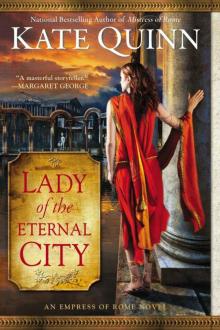 Lady of the Eternal City
Lady of the Eternal City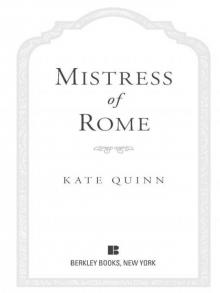 Mistress of Rome
Mistress of Rome Daughters of Rome
Daughters of Rome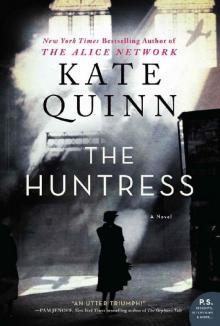 The Huntress
The Huntress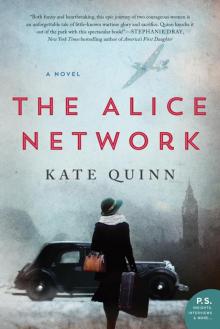 The Alice Network
The Alice Network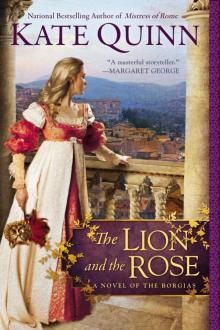 The Lion and the Rose
The Lion and the Rose Empress of the Seven Hills
Empress of the Seven Hills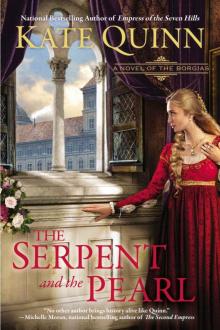 The Serpent and the Pearl
The Serpent and the Pearl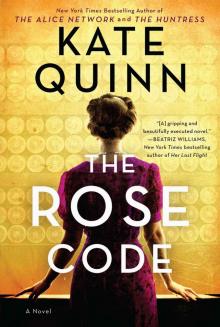 The Rose Code
The Rose Code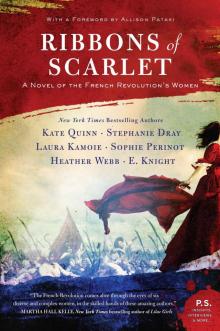 Ribbons of Scarlet
Ribbons of Scarlet A Song of War: a novel of Troy
A Song of War: a novel of Troy